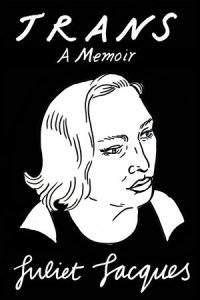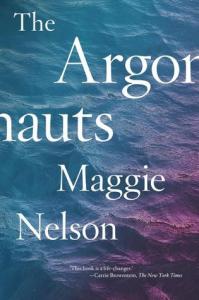Three more books I read recently and want to talk about.
Trans – Juliet Jacques

As far as trans memoirs go, this is an interesting book. It’s informative first of all, as Jacques includes sections on trans history, trans studies and the trans memoir genre itself. She also attempts to subvert the format of trans narratives, mainly by presenting transition as a process, and by skipping on the lurid descriptions of surgery. As a piece of literature however, this book feels lifeless. Jacques ‘ struggle with depression comes through not so much in her descriptions of it, but in her numb, emotionless prose. Her writing only livens up when she talks about culture and theory, and it is clear that’s what she’d rather be doing. Trans is just Jacques paying her dues as a trans writer- and she uses her life story to show that trans people are more than just life stories. I call that success. All I hope is that she goes on to develop her narrative voice in formats closer to her heart.
I attended a talk with Juliet Jacques last year – you can read about it here.
Black Skin, White Masks– Frantz Fanon

Written in 1952, this book is a psychoanalytical study of the effects of French colonialism and racism on the psyche of West Indians (Martinicans in particular). It’s also a cornerstone of the fields of Race and Postcolonial Studies, and as such, I wasn’t surprised to find that many of its observations are still topical in France, and applicable to other communities. I felt the need to jot down pages of quotes, as if bringing Fanon’s words to light was the solution to the racial mess my country is in. All the same, this book is unbearable in its misogyny. Women are secondary to the discussion, clearly, but let’s not forget how hysterical they are, and how black women are in great part responsible for the colonization of black men’s minds. Oh, and homosexuality is a psychosis. So yes. I’m disappointed. I don’t want to ignore the call to self-reflect and decolonize the mind, but it’s difficult to take it seriously when its author is not addressing his own blind spots.
The Argonauts – Maggie Nelson

This is a memoir of Nelson’s relationship with gender-fluid artist Harry Dodge, and of their family-making. The title of the book refers to Roland Barthes’ statement that each utterance of “I love you” renews the meaning of the words, just like the Argonauts renew the parts of their ship Argo without changing its name. In other words, she proposes that love not only defy gender, but be “an endless becoming”. In fact, she presents all of her topics of choice (mainly gender, femininity, motherhood and queerness) as ongoing conversations, and seeks to demythologize them by approaching them through different lenses. I will admit that I got a bit frustrated with some of these lenses- the art criticism and philosophy bits specifically- but I suspect this is because I took too much time to read the book and became impatient. It is a 180 page- stream of consciousness, so it’s probably better consumed in a couple of gulps. Either way, read it. It’s pressing in its urge to deconstruct, and it’s full of love.
I did not enjoy the first two books very much, albeit for very different reasons. The Argonauts, on the other hand, definitely gets my vote. I must have underlined half the text as I went along, and might have drawn a few hearts in the margins as well. You should give it a shot.
Read my previous non-fiction round-ups below:
Round-up 2: Sister Outsider, Unspeakable Things and Between the World and Me
Round-up 1: Bad Feminist, Discourse on Colonialism and Redefining Realness


[…] 4: The X-Files (TV Milestone Series), Dear Ijeawele and On Tyranny Round-up 3: Trans, Black Skin, White Masks and The […]
LikeLike
[…] Round-up 3: Trans, Black Skin, White Masks and The Argonauts […]
LikeLike
hmmm I might check out Argonauts (I can’t struggle through the other 2 I don’t think), as I’m into Barthes and you do highlight some interesting ideas there. Love defying gender (or indeed sex) seems logical to me, although for some reason I just don’t “feel” that way personally. Sounds intriguing if they are implying that this is changeable or evolving somehow. Why not?
LikeLike
Yay, glad to hear you’re interested! It’s mostly her relationship she describes as being in constant evolution -and her partner’s gender as part of that-, she doesn’t generalise I don’t think. But she enjoys the changeability of it all so much, and she loves her husband so much, that her relationship feels like it could be a general example. In any case, it’s not a long book, so even if you don’t agree it’s not a big investment xx
LikeLike